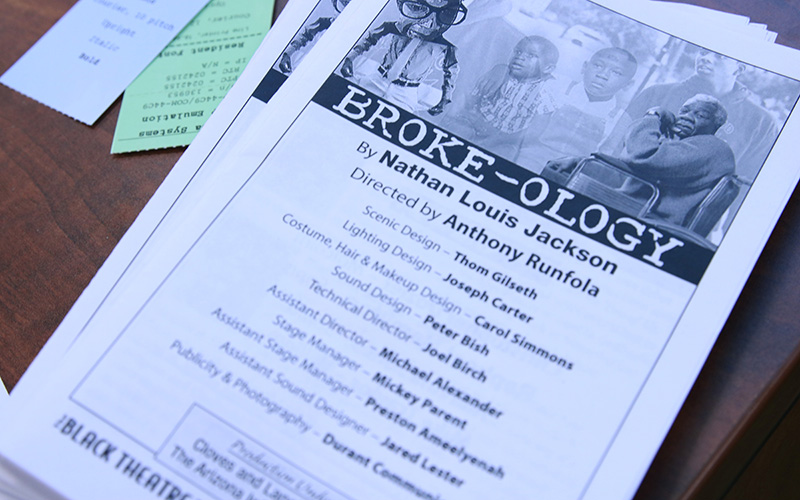
The Black Theatre Troupe, founded nearly a half century ago, this season performed Broke-ology, a play about the hardships of a family living in a poor neighborhood. (Photo by Jessica Clark/ Cronkite News)
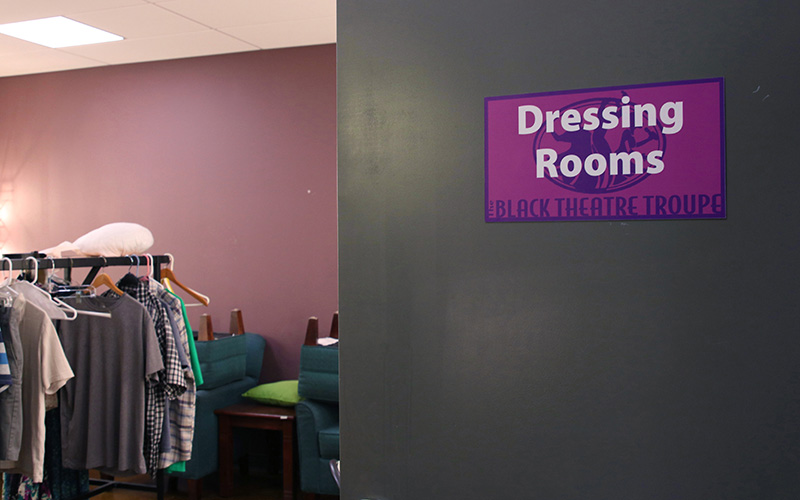
It’s just two hours before a matinee showing of Broke-ology. The cast will soon step into this room with a mauve wall to dress and start the transition from their real lives to their characters’. (Photo by Jessica Clark/ Cronkite News)
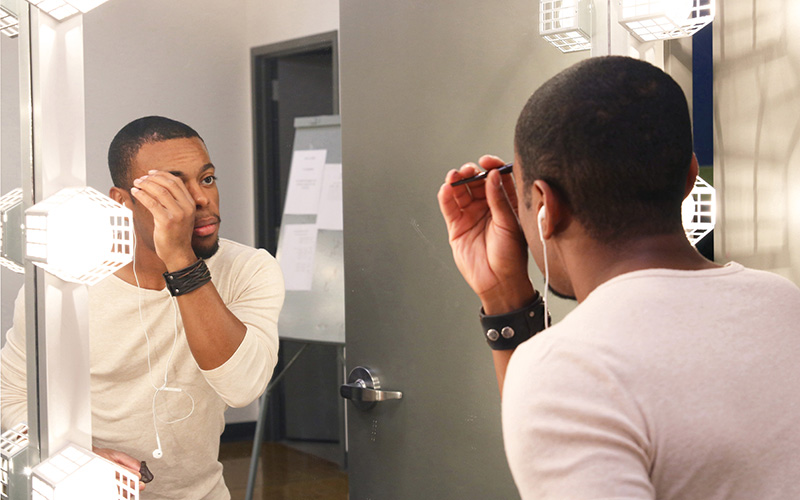
Christopher Dozier, 27, prepped for his starring role as Malcolm King in Broke-ology. He says the cast has been rehearsing since the begining of January and is excited to perform for an audience. (Photo by Jessica Clark/ Cronkite News)
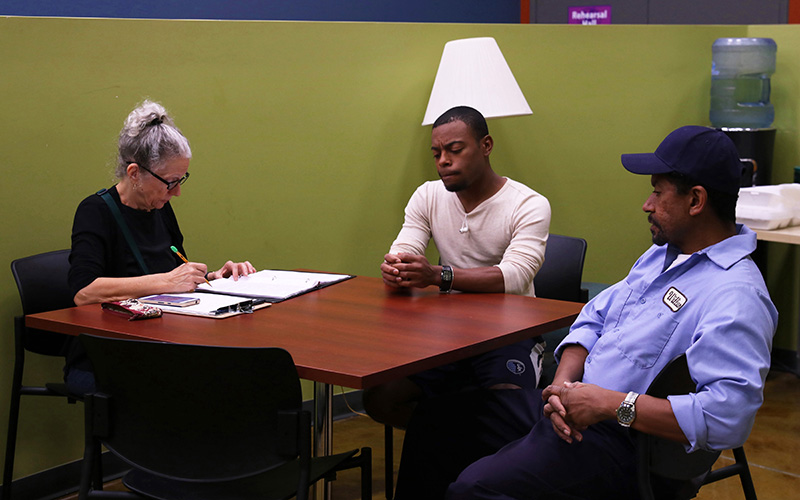
Artistic director Mickey Parent, left, goes over some of the more difficult scenes with actors Christopher Dozier and Mike Traylor, right. Dozier, as Malcolm King, loves and respects his neigbhorhood but is frustrated with its fading glory. Traylor, playing his father, responds: “It’s not about the about the buildings. It’s about the people in them.” (Photo by Jessica Clark/Cronkite News).
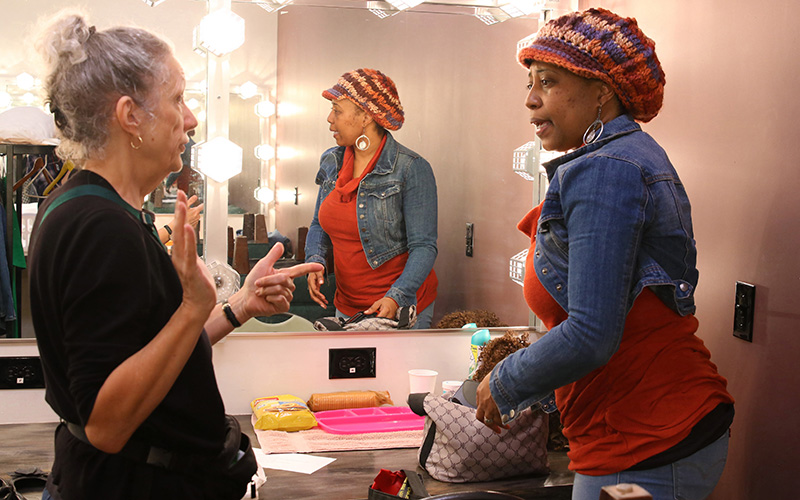
One hour until showtime. The race against the clock continues as Parent rounds up the rest of the cast to review lines before heading on stage. Melvina Jones, right, plays the mother of the King family. (Photo by Jessica Clark/ Cronkite News)
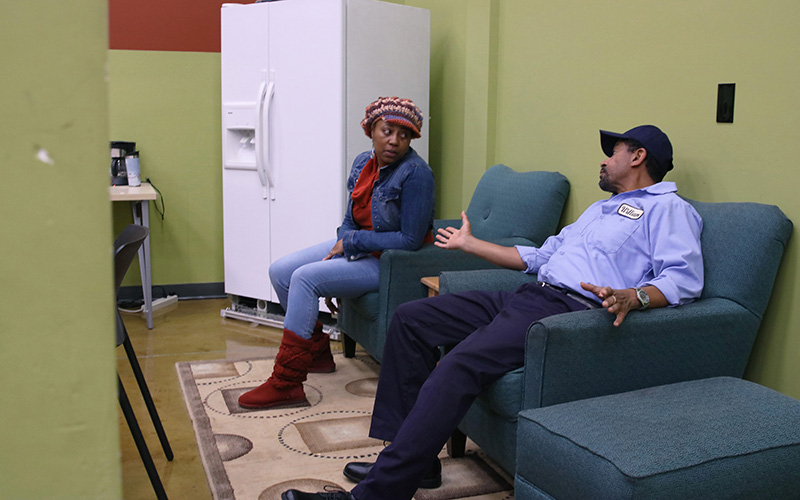
Melvina Jones who plays the role of the King family’s mother and actor Mike Traylor rehearse lines before the Thursday showing at the The Helen K. Mason Performing Arts Center. (Photo by Jessica Clark/Cronkite News)
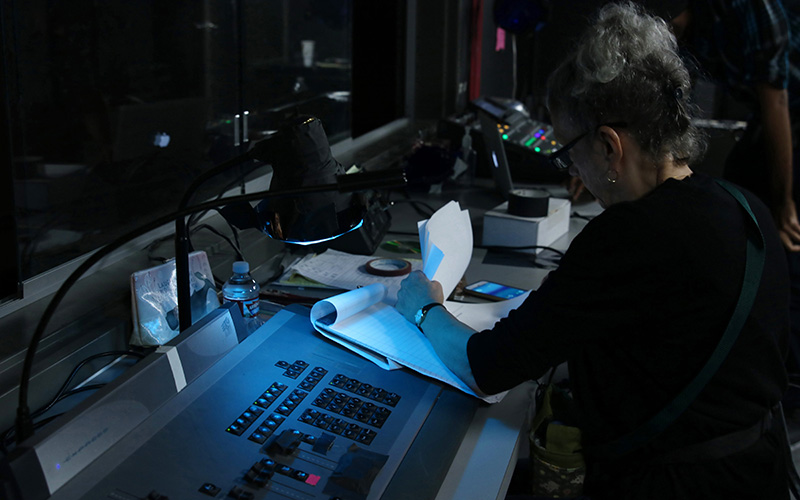
Next up: Mickey Parent checks on everything as one of the people most responsible for the success of the afternoon’s performance. She checks backstage equipment and presets lighting cues. (Photo by Jessica Clark/Cronkite News)

Actor Mike Traylor, who has been acting since the 8th grade, stays stoic as he quietly waits for the show to start. He says he’s excited to see how the audience reacts. (Photo by Jessica Clark/Cronkite News)
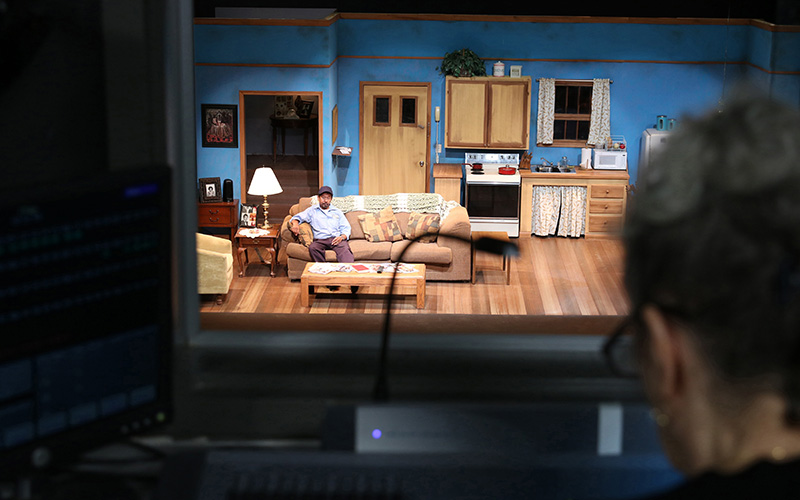
Actor Mike Traylor helps out before the performance by sitting in place for lighting and sound checks. (Photo by Jessica Clark/Cronkite News)
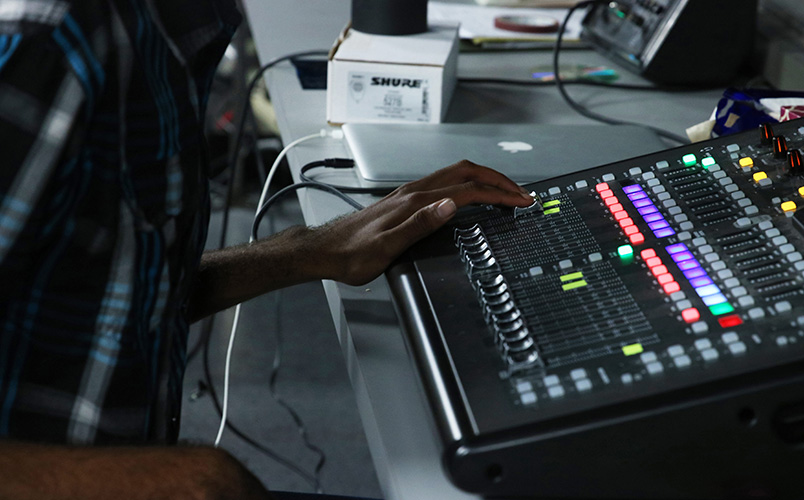
Assistant sound designer Jared Lesler tries to smooth out sound-board glitches before showtime. (Photo by Jessica Clark/Cronkite News)
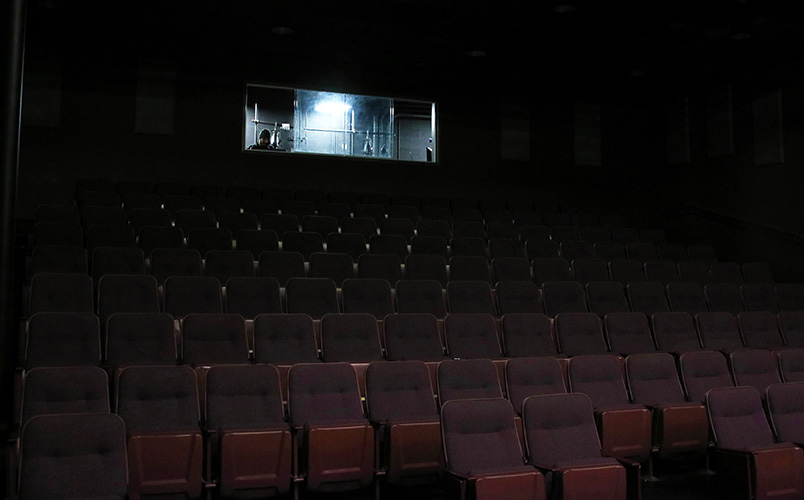
The calm before the theatrical chaos. The auditorium is quiet before the audience claims seats at the theater. (Photo by Jessica Clark/ Cronkite News)
PHOENIX – Theater starts with an idea – a dream, a passion or a problem. Diverse theater in Arizona takes another step, giving voice to communities that otherwise get little attention on stage.
Diverse performing arts groups in Arizona range from the decades-old Black Theatre Troupe and Arizona Jewish Theatre Company to smaller groups like New Carpa Theatre Company and Teatro Bravo, which focus on Latino issues. The troupes tell original stories of communities that often go unheard, develop cultural understanding and educate different audiences. Some struggle financially and are trying to diversity staff and management behind the scenes.
It’s a performance of love, those involved in the craft say.
David Foster, a member of the Teatro Bravo board of advisors, said theater can pierce through naivete to exhume greater understanding in society.
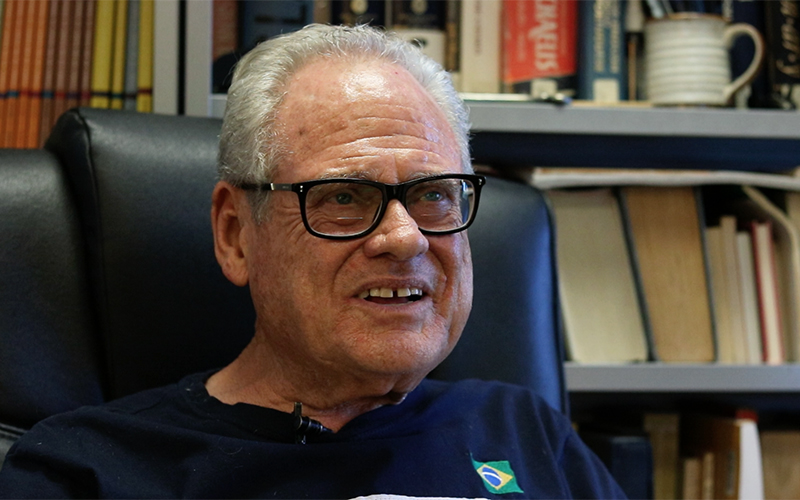
David Foster is a member of the Teatro Bravo board of advisors, a Latino theater that produces shows in English and Spanish. (Photo by Jessica Clark/Cronkite News)
Teatro Bravo was founded in 2000 as a bilingual theatre company which produces parallel plays in English and Spanish to enlighten audiences about Latino experiences.
New Carpa Theatre founder James Garcia shares a similar passion.
“Part of my goal and mission is to add to the canon of works that exist and provide the Phoenix community, particularly the Latino community, a place where they can come and see themselves on stage,” Garcia said of the theater company he founded in 2002.
Because of limited works surrounding the Latino community, the New Carpa Theatre founder wants to provide a place for actors of color to harness their artistic talents on stage.
Garcia said he could produce standard Broadway productions with a predominantly Latino cast “to be edgy,” but classic works like Who’s Afraid of Virginia Woolf or Death of a Salesman were originally written for Anglo characters and prefers to write about material concerning his community with the ability to cast a diverse range of actors.
Garcia’s current work, 1070, was inspired by Arizona’s controversial Senate Bill 1070, enacted in 2010. The production will explore the immigration policy’s national infamy and impact when it debuts in mid-summer.
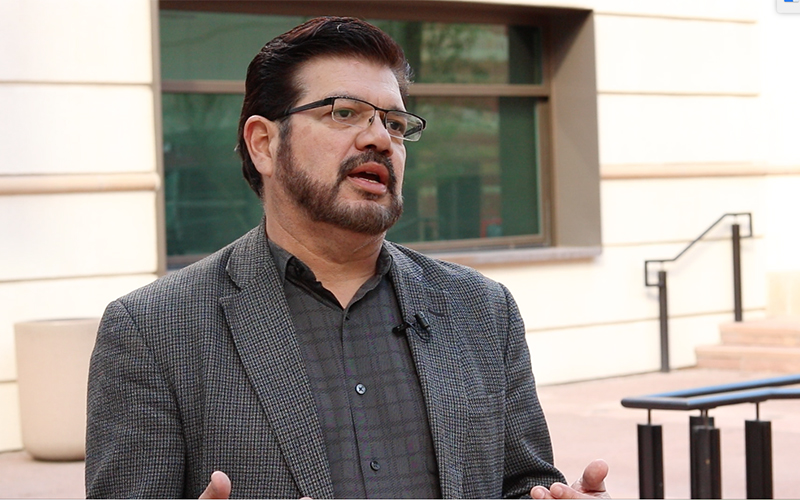
James Garcia founded New Carpa Theatre Company. His mission is to encourage and provide working jobs for actors of color and create theatrical content surrounding the Latino community in Phoenix. (Photo by Jessica Clark/ Cronkite News)
Seeking diversity on stage and behind the scenes
Black Theatre Troupe has showcased the work and talent of multicultural actors in the Phoenix area since 1970. The troupe, comprised of an African-American cast, has a mission to stimulate cultural awareness, provide a voice for diverse communities and “illuminate the African-American experience,” according to their website.
Black Theatre Troupe is the oldest and most enduring diverse performing arts group in the Valley.
Douglas Clarke, scenic director for Black Theatre Troupe and Phoenix Theatre’s most recent collaboration, Scottsboro Boys, thinks diversity of story and cast can mask a lack of diversity behind the scenes, especially a gender gap. Men dominate top positions in technical and stage design, lighting, sound and set construction, Clarke said.
“It’s very interesting to think of a theater as one or the other or being diverse or not, and things like casting have always been touchy,” he said.
Clarke thinks that while it’s justified to look at who’s telling the story that should not always define or take away from the story being told.
The Scottsboro Boys musical, based on history, outlines false rape allegations against nine African-American teenagers who are sentenced to death in 1933 in the South. The musical was written by three white men; David Thompson, playwright; John Kander, composer; Fred Ebb, lyricist.
Keeping the doors open: the financial battlefield
Diverse theater organizations can struggle financially to cover production costs. Most exist on donations, grants and ticket sales.
Garcia said the recession’s aftermath means state and city grants devoted to the art scene have been thin. Theater organizations have to get creative: he expects nearly half of the funds for 1070 will come through crowdfunding because of the national notoriety surrounding the legislation.
Some theatre spaces owned by groups and businesses in the Valley provide free space for rehearsal and production purposes, a welcome relief when rent can cost more than half of a production’s budget, Foster said.
Larissa Brewington, a local playwright, has written and performed shows at the Herberger Theatre in downtown Phoenix.
For Brewington, her partnership with the theater has awarded her frequent opportunities to watch her written work about historical cultural events surrounding the African-American community come to life on stage.
Her show, A Legacy of Justice,was performed as part of the Herberger’s Lunch Time Theatre program for emerging playwrights and organizations. Brewington said the program often reimburses costs for costumes and sets, pay royalty fees and market such plays in addition to free stage and rehearsal space.
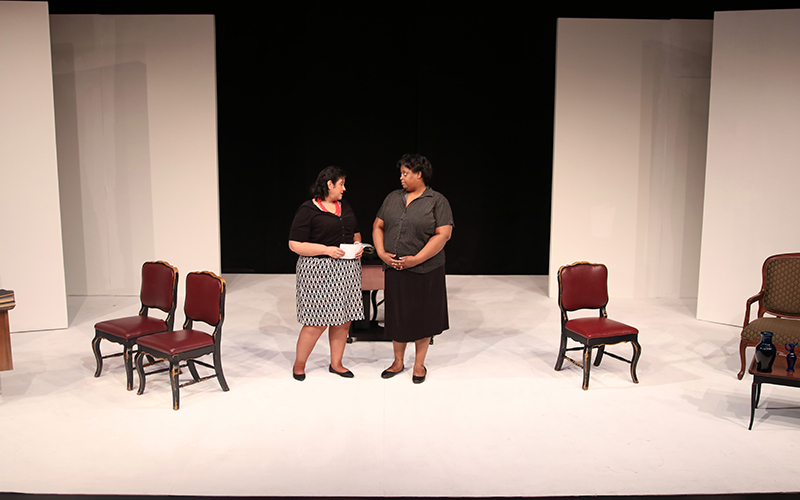
Playwright and actress Larissa Brewington, right, and Michelle Y. Allen rehearse minutes before they go on stage at the Herberger Theater for A Legacy of Justice , one of dozens of plays Brewington has written. (Photo by Jessica Clark/ Cronkite News).
The audiences for diverse theater
Performances are aimed at a specific ethnic, racial or religious group but the audiences are multicultural. Garcia said most of the people who come to plays at New Carpa Theatre are of Latino descent.
Garcia describes his work as not fitting within the lines “of the established canon,” which he says limits his audiences.
Though the drawbacks of producing original content affect audience engagement for smaller theatres, Garcia said he would have it no other way.
“I might be doing community theatre, but I also take the mission of it very seriously,” he said.
Garcia’s creative passions match his love for the stage.
The desire to write things to and for his community while providing actors of color work and stage time is the fuel Garcia and other emerging, diverse theatres use to keep a creative inferno ablaze.